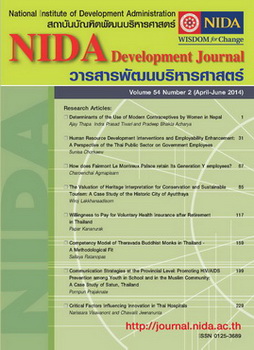Communication strategies at the provincial level: promoting HIV/AIDS prevention among youth in school and in the Muslim community: a case study of Satun, Thailand
Main Article Content
Abstract
Due to Islamic tenets restricting contraception both inside and outside the context of marriage—even for preventing the spread of HIV/AIDS—public health officers, nurses, and NGO workers in Satun province in Thailand have been challenged to extend their coverage of HIV prevention programs to the Muslim community. The objectives of this study were to examine communication strategies to promote HIV/AIDS prevention among youth in school and in the Muslim community, and to identify the factors that facilitate or hinder health service providers in implementing HIV/AIDS prevention programmes. The study was undertaken in October, 2009 in Satun province. Four methods were employed, including documentation, archival records, physical artifact, and in-depth interviews. Six key informants, including nurses, health officers and NGO workers that were engaged, at the time, in implementing STIS/HIV/AIDS programmes, were interviewed. The results from the case study indicated that the Satun Provincial Public Health Office identified peer leaders among the members of the community and motivated them to participate in the HIV/AIDS prevention programs and to distribute messages about HIV/AIDS and health-related issues because they had similar backgrounds and used non-medical terminology.
Article Details
Section
Articles

